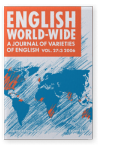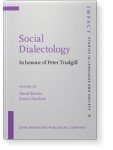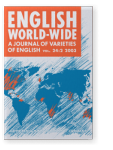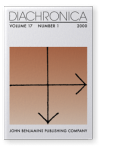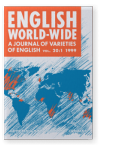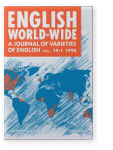Elizabeth Gordon
List of John Benjamins publications for which Elizabeth Gordon plays a role.
2010 Describing and complaining: Written evidence of early New Zealand English pronunciation Varieties of English in Writing: The written word as linguistic evidence, Hickey, Raymond (ed.), pp. 349–364 | Article
This chapter considers the written evidence of New Zealand pronunciation provided in 1887 by Samuel McBurney a self-taught phonetician, and the evidence from complaints about pronunciation in the early New Zealand School Inspectors’ Reports, and the literary journal The Triad. This written evidence… read more
2006 Predicting the past: Dialect archaeology and Australian English rhoticity English World-Wide 27:3, pp. 235–246 | Article
The division of the world’s Englishes into rhotic and non-rhotic types is clearly due to the fact that the former are conservative in not having undergone loss of non-prevocalic /r/, whereas the latter have. The beginnings of the loss of non-prevocalic /r/ in English have generally been dated by… read more
2003 Variation and sound change in New Zealand English Social Dialectology: In honour of Peter Trudgill, Britain, David and Jenny Cheshire (eds.), pp. 69–80 | Article
2003 The regional and sociolinguistic dimension of /hw/ maintenance and loss in early 20th century New Zealand English English World-Wide 24:2, pp. 245–269 | Article
This paper investigates the regional dimension of new-dialect formation and feature maintenance and loss in early 20th century New Zealand English (NZE). Examining the distribution and status of voiceless labiovelar /hw/ fricatives (which results in an articulatory contrast between Wales and… read more
2000 The role of drift in the formation of native-speaker southern hemisphere Englishes: Some New Zealand evidence Diachronica 17:1, pp. 111–138 | Article
SUMMARY Similarities between different geographically separated varieties of a single language may in some cases be due not to characteristics inherited directly from some parent variety, nor to any diffusion or direct contact between them, but to processes of the type which Sapir labelled ‘drift’.… read more
1999 Shades of Things to Come: Embryonic Variants in New Zealand English Sound Changes English World-Wide 20:1, pp. 111–124 | Article
In Trudgill's 1983 follow-up of his 1968 urban dialect survey of Norwich, he showed that a labio-dental approximant pronunciation of /r/ which he had formerly dismissed as purely idiosyncratic, was actually early evidence of a sound change. Using this insight, the authors have taken present-day… read more
1998 The Origins of New Zealand Speech: The Limits of Recovering Historical Information from Written Records English World-Wide 19:1, pp. 61–85 | Article
New Zealand English has evolved in the past 150 years, at a time when it is possible to find both written and spoken evidence of its development. This paper takes evidence gained from an analysis of written comments on early New Zealand English and compares this with data taken from an analysis of… read more

